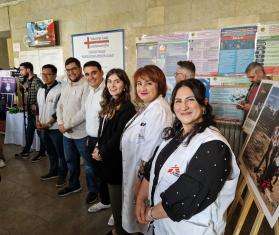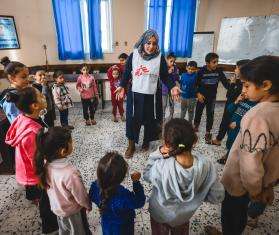Amidst ongoing fighting in South Sudan’s Unity State, ever more people are seeking shelter and protection at the United Nations Protection of Civilians camp in Bentiu, where an estimated 110,000 displaced people are now living—twice as many as there were just a few months ago.
Facilities under strain
The influx has increased pressure on existing resources, including the Doctors Without Borders/Médecins Sans Frontières (MSF) hospital at the camp, which is nearing full capacity. Teams have seen a significant increase in malaria cases over the past month and have treated more than 2,000 cases in July alone, admitting more than 150 people with severe complicated malaria.
“In an attempt to reduce this, and to limit the complications of severe malaria, we’ve started supporting three emergency clinics in the camp for children under five years old that provide swift access to diagnostics and treatment,” says Dr. Ruby Siddiqui, an MSF epidemiologist now working in the UN Protection of Civilians camp in Bentiu.
“Severe malnutrition is equally concerning,” Siddiqui continued. “In July alone, our hospital admitted more than 100 young children suffering from severe malnutrition with complications for intensive therapeutic treatment. Unfortunately many children arrived too late at the hospital with advanced symptoms, resulting in a very high mortality.” A mortality rate of 23 percent was reported in July.
Risk of disease outbreak
There is also a real risk of an outbreak of hepatitis E. Although cases have been detected sporadically since October 2014, over the past six weeks, significantly more patients have been presenting with jaundice, which signals liver inflammation, and later testing positive for hepatitis E. Some 37 percent of patients are requiring hospitalization at present and 4 percent of the cases are proving fatal, including three women who were either pregnant or had recently given birth.
READ: HUMANITARIAN ACCESS URGENTLY NEEDED IN UPPER NILE STATE
Poor hygiene
Contaminated water, poor sanitation and hygiene provision are customarily implicated in major outbreaks of hepatitis E. In light of the suspected outbreak, the hygiene conditions in Bentiu Protection of Civilians camp need to be urgently improved. This includes establishing more hand washing facilities and supplemental soap distributions. Targeted outreach that conveys hygiene messages is also necessary to help people to reduce their own transmission risks and better understand the signs and symptoms of hepatitis E infection.
Intensified efforts needed
“MSF urges all health care providers, water and sanitation actors, and donors to intensify their efforts within the Bentiu Protection of Civilians camp as soon as possible in the hope of stemming further disease transmission and alleviating the suffering of displaced people living in this camp,” says Dr. Siddiqui.





